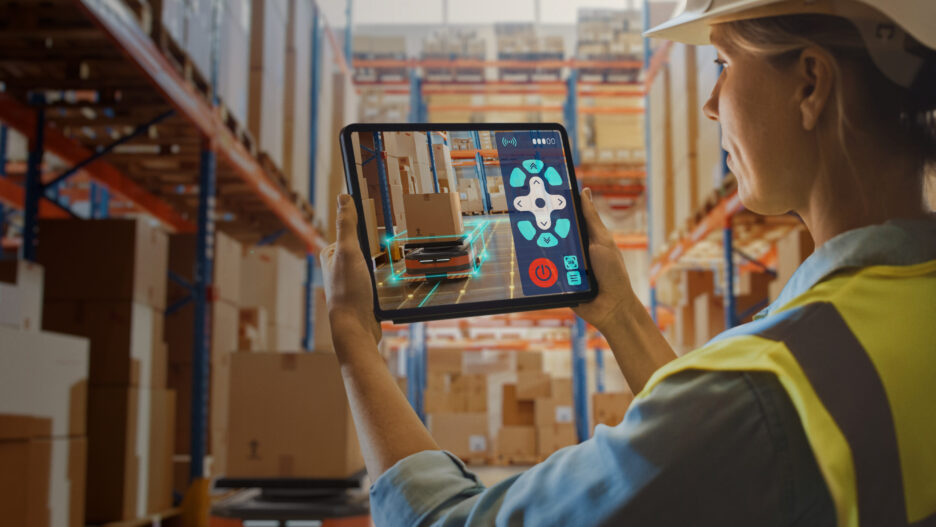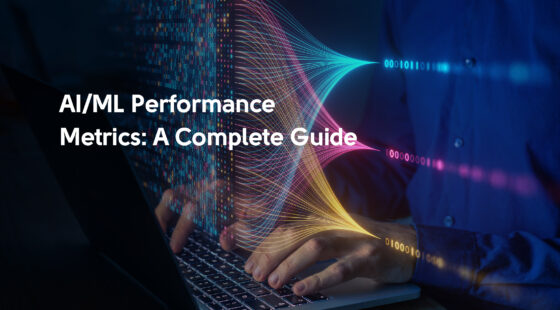Optimizing operations is essential in the logistics and transportation industry to maintain competitiveness in an increasingly demanding market. AI usage in logistics is transforming the industry, addressing challenges such as inefficiencies, delays, and increased costs and providing significant opportunities for improvement. Artificial intelligence and machine learning (AI/ML) technologies are proving instrumental in optimizing supply chain operations, enhancing customer satisfaction, and reducing operational expenses.
The global automotive artificial intelligence market size is valued, as of 2022, at $13.8 billion and is slated to reach $405.3 billion by 2032. In parallel, the global AI in logistics market is forecasted to reach $549 billion by 2033, growing over 46.7% in the 2024-2033 period.
With that context in mind, this article explores the implementation of AI in logistics and transportation, highlighting the many opportunities these technologies provide, including route optimization, predictive maintenance, demand forecasting, and autonomous vehicles.
AI Regulatory Frameworks
The regulation of Artificial Intelligence in logistics and transportation is rapidly evolving, reflecting the complexities of emerging technologies. Inconsistent regulations across jurisdictions complicate compliance and enforcement, often relying on self-regulation that can lead to conflicts of interest. The European Commission’s funding schemes have introduced ethics appraisal procedures, which may serve as valuable precedents for future regulatory frameworks. As the scale of data integration and demands for data privacy and security grow, new governance mechanisms are required to ensure effective oversight and enforcement.
Impact on Innovation and Competition
Regulatory frameworks have a significant impact on innovation and competition within the logistics and transportation sectors. The introduction of strict regulations, such as the proposed EU’s AI Act, may increase costs and delay product launches, potentially disadvantaging European companies compared to those in less regulated regions.
Furthermore, existing regulations like the General Data Protection Regulation (GDPR) and the California Consumer Privacy Act (CCPA) enhance transparency and explainability but often fall short in addressing accountability needs, creating operational challenges for companies seeking to scale their solutions across the European market.
Navigating Diverse Regulatory Requirements
Companies operating in multiple jurisdictions face the challenge of navigating a complex web of diverse regulatory landscapes. Compliance with varying laws can escalate costs and reduce efficiency, ultimately hindering the scalability of AI solutions in logistics and transportation. The lack of harmonization in regulations can obstruct the establishment of global AI standards, compelling companies to customize their offerings to meet local requirements. This situation emphasizes the need for harmonized regulations that can facilitate cooperation among nations and support the safe deployment of AI technologies while maintaining global market access.
Recommendations for Regulatory Improvements
It is essential for regulatory agencies to engage in collaborative efforts to enhance the regulatory environment for AI in logistics and transportation. Sharing regulatory expertise and best practices among countries can lead to more effective governance of AI technologies. Additionally, establishing harmonized regulations can create a level playing field for companies, minimizing the costs associated with tailoring products to meet different regional requirements. These measures would not only promote innovation but also ensure user safety and ethical standards in AI deployment.
The Role of AI in Logistics and Transportation
Undoubtedly, AI enhances operational efficiency and enables real-time decision-making. AI/ML technologies help logistics companies address numerous challenges, such as fleet management, route planning, predictive maintenance, demand prediction, and more.
Below, we discuss some of the prominent AI use cases in logistics and transportation that are helping companies achieve these benefits.
1. Route Optimization
Efficient route planning is critical to reducing transportation costs and ensuring timely deliveries. AI-based route optimization uses historical data, weather conditions, traffic patterns, and other factors to determine the best routes for deliveries. This capability helps logistics companies minimize fuel consumption, reduce delivery times, and ultimately cut costs.
AI-powered route optimization can dynamically adjust routes in real time based on unexpected events such as road closures, weather changes, or accidents. This adaptability significantly reduces delays and allows for more reliable deliveries. According to a recent report, logistics companies can achieve up to a 15% reduction in fuel costs by implementing AI-based route optimization solutions.
A practical example of AI in route optimization is Svitla Systems' Fuel Management Analytics case study, where an AI-driven solution helped streamline fuel consumption, reduce costs, and improve operational efficiency.
2. Predictive Maintenance
Vehicle maintenance is a significant cost factor in logistics. AI-powered predictive maintenance solutions analyze data from sensors embedded in vehicles to predict when maintenance is required, thereby reducing downtime and preventing unexpected breakdowns. Predictive maintenance uses machine learning algorithms to monitor vehicle health in real time and proactively identify issues before they escalate into major problems.
Recent findings show that implementing predictive maintenance can reduce maintenance costs by up to 30% and decrease equipment downtime by 45%. By leveraging AI for maintenance, logistics companies can optimize fleet performance, improve safety, and enhance reliability.
AI also makes a considerable impact by helping fleet managers anticipate repair needs based on historical data. For example, machine learning models can analyze variables like temperature, engine hours, and driving habits to predict when a component is likely to fail. This predictive approach ensures that companies can schedule maintenance during downtime, reducing disruption and prolonging the lifespan of their assets.
3. Demand Forecasting
Demand forecasting is another powerful application of AI in logistics and transportation. By predicting customer demand accurately, companies can optimize inventory management, reduce costs, and ensure that resources are allocated effectively. AI algorithms analyze historical sales data, seasonal trends, and external factors (such as economic conditions and weather) to provide accurate demand forecasts.
Accurate demand forecasting improves inventory management and enhances production planning, reducing stockouts and minimizing excess inventory. This results in better customer satisfaction and increased efficiency across the supply chain.
For instance, logistics giant DHL has integrated AI-driven demand forecasting solutions that have helped the company improve its planning capabilities and optimize resource utilization. The AI models have enabled DHL to meet customer demand more effectively while minimizing costs associated with overstocking or understocking.
4. Autonomous Vehicles
Autonomous vehicles in logistics is one of the most exciting and transformative applications of AI in transportation. AI enables autonomous vehicles to navigate, identify obstacles, and make real-time decisions, thereby reducing human error and improving the safety and efficiency of transportation operations.
Companies like Waymo and Tesla are leading the charge in developing autonomous trucks that promise to revolutionize logistics by offering safer and more efficient modes of transportation. Autonomous trucks can operate for extended periods without rest, reducing the need for driver breaks and enabling faster deliveries.
According to a report by PwC, autonomous vehicles are poised to generate between $300 and $400 billion in revenue by 2035. They’re also slated to reduce crashes by 90%. In addition, autonomous vehicles equipped with AI technology can communicate with other vehicles and infrastructure, creating a connected ecosystem that optimizes traffic flow and further reduces delays.
5. Warehouse Automation
AI-driven warehouse automation is revolutionizing the logistics sector. Robots with AI capabilities handle various tasks such as picking, packing, and inventory management. This automation accelerates order fulfillment and minimizes labor costs, leading to substantial cost savings for logistics companies. Furthermore, machine learning algorithms adapt warehouse organization based on predicted demand patterns, resulting in optimized space utilization and reduced errors in inventory management.
6. Enhanced Customer Service
The integration of AI-powered chatbots and virtual assistants has transformed customer logistics support. These intelligent systems handle inquiries, track shipments, and provide 24/7 status updates to customers, significantly improving response times and overall customer experience. By automating routine interactions, logistics companies can focus on more complex issues while ensuring high service satisfaction levels.
7. Supply Chain Visibility
AI augments supply chain visibility by providing real-time insights across the entire logistics chain, from raw material procurement to final delivery. This capability is vital for identifying potential bottlenecks and optimizing workflows. According to a McKinsey survey, “respondents who have implemented dashboards for end-to-end visibility has jumped significantly to 79%, and attention has switched firmly to improving supply chain planning processes. That might be because improved visibility has revealed weaknesses in companies' underlying processes to manage their supply chains: 71 percent of respondents say that they expect to revise their current planning processes and governance over the next three years.”
8. Yield Loss Analysis
Beyond enhancing existing processes, AI in logistics investigates the root causes of underperformance. By analyzing data on operational inefficiencies, companies can derive insights to optimize performance and decision-making, ultimately increasing profitability and return on investment.
9. Traffic Management Systems
AI is employed in intelligent traffic management systems that optimize traffic flow and reduce congestion. By analyzing big data, AI can predict and manage traffic patterns, minimizing waiting times and improving overall transportation efficiency. For instance, AI systems in cities like London and New York can adjust public transportation services based on predicted passenger flows, enhancing reliability and user experience.
10. AI-Powered Fleet Management
AI systems provide real-time insights into fleet status and location, enhancing operational efficiency. Through GPS integration and predictive analytics, businesses can proactively monitor fuel efficiency, plan routes, and schedule maintenance. This level of management contributes to reduced fuel costs and improved delivery timelines.
11. Customer Service Enhancements
AI-powered chatbots are transforming customer interactions in the transportation industry. Equipped with natural language processing capabilities, these chatbots can assist customers with inquiries, schedule services, and gather feedback, ultimately improving service efficiency and user satisfaction.
12. Hyperautomation in Logistics
Hyperautomation, which combines AI with robotic process automation, is used to automate various back-office tasks in the transportation sector. This includes scheduling, tracking shipments, and managing employee workflows, leading to increased operational efficiency and reduced manual labor. As AI continues to evolve, its applications in transportation are expected to expand, driving further advancements in safety, efficiency, and sustainability across the industry.
Opportunities and Benefits of AI in Logistics and Transportation
The implementation of AI in logistics and transportation opens up a wealth of opportunities that help companies achieve operational excellence. Here are some of the key benefits:
1. Cost Reduction
AI solutions help reduce operational costs through efficient resource utilization, minimized fuel consumption, predictive maintenance, and optimized inventory management. By leveraging AI, companies can identify cost-saving opportunities that were previously undetectable through manual analysis.
2. Real-Time Decision Making
AI enables real-time decision-making, allowing logistics companies to react swiftly to changes in demand, traffic conditions, or equipment health. This agility is crucial in an industry where delays can lead to significant financial losses.
3. Improved Customer Satisfaction
Timely deliveries and accurate demand forecasting directly contribute to improved customer satisfaction. AI helps logistics companies maintain on-time delivery rates and optimize stock levels, ensuring customers receive orders when and where they expect.
4. Enhanced Safety
AI-powered autonomous vehicles and predictive maintenance solutions improve the safety of transportation operations by reducing human error and preventing equipment failure. AI also provides drivers with advanced assistance systems, such as collision avoidance and lane-keeping technologies, to enhance safety.
5. Better Inventory Management
AI-driven demand forecasting allows logistics companies to manage inventory more efficiently, reducing stockouts and excess inventory. This optimization ensures that companies maintain the right inventory balance to meet customer demand without incurring unnecessary costs.
6. Improved Customer Service
AI enhances customer service by providing real-time tracking information and accurate delivery estimates. This level of transparency allows customers to monitor their shipments closely, fostering greater control and trust in the logistics process. Furthermore, AI-powered chatbots enable instant customer support and proactive communication regarding potential delays, significantly boosting customer satisfaction and loyalty
7. Sustainability Improvements
As the logistics industry faces increasing pressures to adopt sustainable practices, AI is pivotal in reducing CO2 emissions and resource wastage. By leveraging high-quality data, logistics firms can optimize operations to minimize environmental impact, contributing to a more sustainable supply chain
Challenges and Limitations
Successfully implementing AI in logistics and transportation is no easy feat. With Generative AI disrupting industries left and right for the last 18 months, it’s crucial to reevaluate how you can plan for and try to minimize as much as possible instead of aiming to reduce them completely.
Data Dependency
One of the primary limitations encountered in the application of AI in logistics and transportation is the dependency on specific datasets. The effectiveness of predictive models is highly reliant on the quality, granularity, and diversity of the data used. Insufficient data, particularly when lacking geographic or demographic insights, can hinder the models' ability to capture the complexities of supply chain operations across different regions or markets. This highlights the necessity for diverse and extensive datasets that encapsulate a broad spectrum of operational contexts to enhance the models' accuracy and applicability.
Data Quality and Availability
The importance of data quality cannot be overstated, as predictive models are only as reliable as the data on which they are built. Poor data quality, missing information, or biases can lead to erroneous results, emphasizing the need for stringent data collection, storage, and management practices. Moreover, challenges such as data input errors can occur, causing issues like improper cargo separation or increased likelihood of hazardous incidents. To mitigate these risks, businesses must implement strict validation processes for data before AI systems begin processing it.
Software Malfunctions
Software malfunctions pose another significant challenge. Issues can arise from programming errors, bugs, or failures in AI algorithms, potentially leading to incorrect decisions in logistics operations. Identifying and rectifying these malfunctions requires a comprehensive understanding of the systems in place and the data they utilize.
Risk Analysis and Management
As supply chains grow more complex, the associated risks increase. Each new element introduces potential for disruptions, such as missed connections or miscommunications. Therefore, logistics companies must develop robust risk management strategies to navigate these challenges effectively. This includes understanding past demand issues and assigning AI to monitor data blind spots to unveil new opportunities.
Ethical and Security Concerns
The implementation of AI also raises ethical concerns regarding user data handling. Key issues include ensuring informed consent from users, data anonymization, and compliance with regional data protection regulations, such as the GDPR and CCPA. Additionally, strong cybersecurity measures are paramount, as AI systems often require access to sensitive data. Companies should prioritize secure data storage, encryption, and access controls to mitigate privacy risks
Algorithmic Bias
Lastly, algorithmic bias presents a critical challenge in AI deployment. Examining AI models for potential biases in the data or decision-making processes is essential. These biases can stem from misrepresentation or flawed assumptions in the datasets used, necessitating ongoing scrutiny and algorithm adjustments.
How to Implement AI in Logistics and Transportation
Implementing AI in logistics and transportation requires careful planning and a strategic approach. Here are some best practices for getting started:
1. Define Clear Objectives
Before implementing AI solutions, logistics companies must define clear objectives. Whether it's reducing delivery times, optimizing fuel consumption, or improving customer satisfaction, having a clear goal helps guide the implementation process and measure success.
2. Invest in the Right Technology
Choosing the right AI technology is critical to the implementation's success. Companies should consider factors such as the solution's scalability, integration capabilities with existing systems, and the availability of technical support. Collaborating with an experienced AI partner, like Svitla Systems, can help companies select and implement the best technology for their specific needs.
3. Start with Pilot Projects
Starting with pilot projects allows logistics companies to test AI solutions on a smaller scale before rolling them out across the entire organization. Pilot projects help identify potential challenges and gather data to assess the solution's effectiveness.
4. Collaborate with AI Experts
Working with AI experts is essential for successful implementation. Partnering with an experienced provider like Svitla Systems ensures that logistics companies have access to the technical expertise and industry knowledge required to develop and deploy AI solutions that deliver real value.
The logistics and transportation industry is transforming and is driven by advancements in AI and machine learning technology. Using AI and ML solutions can help transportation and logistics companies optimize operations, improve customer satisfaction, and reduce costs. Applications like route optimization, predictive maintenance, demand forecasting, and autonomous vehicles set a new standard for a more efficient and sustainable future.
Partnering with a trusted AI expert like Svitla Systems ensures logistics companies can leverage these technologies effectively and achieve their operational goals. With the right AI solutions and expertise, the opportunities for growth and efficiency in logistics and transportation are limitless.
Choosing Svitla Systems as your AI Partner for Logistics and Transportation
Svitla Systems has a strong track record of delivering innovative AI solutions across industries, making it uniquely positioned to help logistics companies harness the power of AI to transform their operations.
Expertise in AI Technologies: We're experts with AI technologies and their application in logistics. We work closely with our clients to develop customized solutions that address specific challenges and deliver measurable results.
Proven Success Stories: Our experience in implementing AI-driven solutions is reflected in our success stories, such as the Fuel Management Analytics project, where we helped a logistics company reduce fuel consumption and improve operational efficiency.
Tailored Approach: We understand that every logistics company is different. At Svitla Systems, we take a tailored approach to developing AI solutions, ensuring our clients receive the tools and strategies that align with their business goals.
Commitment to Quality: Quality is at the core of everything we do. From initial consultation to final deployment, our team is committed to delivering the highest quality solutions that meet our clients' needs.
Contact Svitla Systems today to learn how we can help you implement AI technologies that drive efficiency, reduce costs, and improve customer satisfaction.




